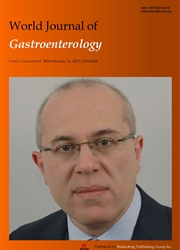

 中文摘要:
中文摘要:
Refractory diabetic gastroparesis(DGP),a disorder that occurs in both type 1 and type 2 diabetics,is associated with severe symptoms,such as nausea and vomiting,and results in an economic burden on the health care system.In this article,the basic characteristics of refractory DGP are reviewed,followed by a discussion of therapeutic modalities,which encompasses the definitions and clinical manifestations,pathogenesis,diagnosis,and therapeutic efficacy evaluation of refractory DGP.The diagnostic standards assumed in this study are those set forth in the published literature due to the absence of recognized diagnosis criteria that have been assessed by an international organization.The therapeutic modalities for refractory DGP are as follows:drug therapy,nutritional support,gastricelectrical stimulation,pyloric botulinum toxin injection,endoscopic or surgical therapy,and traditional Chinese treatment.The therapeutic modalities may be used alone or in combination.The use of traditional Chinese treatments is prevalent in China.The effectiveness of these therapies appears to be supported by preliminary evidence and clinical experience,although the mechanisms that underlie these effects will require further research.The purpose of this article is to explore the potential of combined Western and traditional Chinese medicine treatment methods for improved patient outcomes in refractory DGP.
 英文摘要:
英文摘要:
Refractory diabetic gastroparesis (DGP), a disorder that occurs in both type 1 and type 2 diabetics, is associated with severe symptoms, such as nausea and vomiting, and results in an economic burden on the health care system. In this article, the basic characteristics of refractory DGP are reviewed, followed by a discussion of therapeutic modalities, which encompasses the definitions and clinical manifestations, pathogenesis, diagnosis, and therapeutic efficacy evaluation of refractory DGP. The diagnostic standards assumed in this study are those set forth in the published literature due to the absence of recognized diagnosis criteria that have been assessed by an international organization. The therapeutic modalities for refractory DGP are as follows: drug therapy, nutritional support, gastric electrical stimulation, pyloric botulinum toxin injection, endoscopic or surgical therapy, and traditional Chinese treatment. The therapeutic modalities may be used alone or in combination. The use of traditional Chinese treatments is prevalent in China. The effectiveness of these therapies appears to be supported by preliminary evidence and clinical experience, although the mechanisms that underlie these effects will require further research. The purpose of this article is to explore the potential of combined Western and traditional Chinese medicine treatment methods for improved patient outcomes in refractory DGP.
 同期刊论文项目
同期刊论文项目
 同项目期刊论文
同项目期刊论文
 期刊信息
期刊信息
